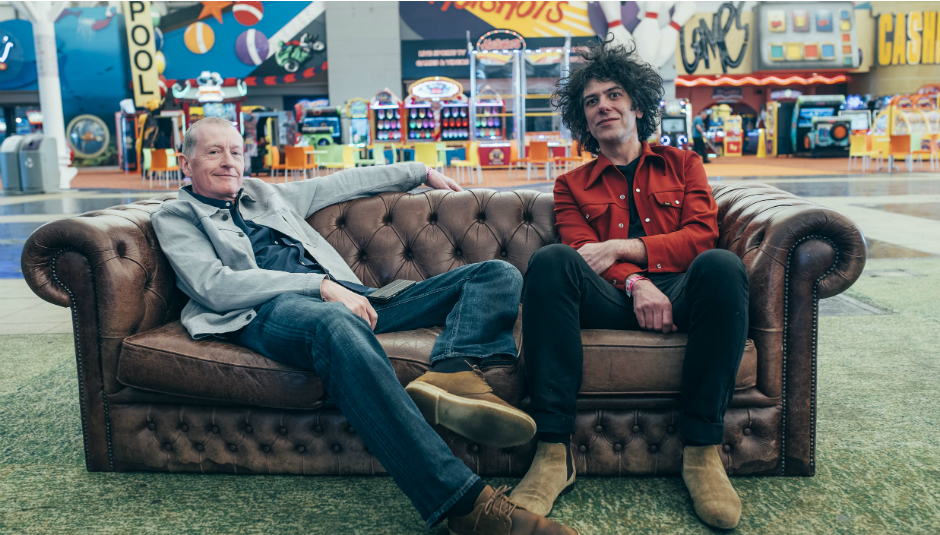One of the joys of the last few years in the music industry has been the rise and rise of Steve Davis as one of the most well-loved and respected DJs and radio hosts in the country. The six-time World Snooker Champion, for so long ironically perceived by the public as “Mr Interesting”, thanks in large part to his Spitting Image doll, turned out to be far more interesting than anyone could have imagined. He recently turned 60 and has helmed The Interesting Alternative Show on Phoenix FM for over a decade alongside the prog savant Kavus Torabi, founder of Knifeworld and current member of Gong. The two have become a staple on the festival circuit too, bringing their far-reaching, experimental tastes to wider and wider audiences. We spoke to them ahead of their set at Festival No. 6 this weekend (September 8-10).
DiS: I think we’ve pushed through the stage where the notion of you two being friends and working together is a novelty. You’re now an established part of the music community. Do you feel that way?
Kavus Torabi: Oh gosh. That’s always been the plan. It never really felt like a novelty to us, but we were very aware of how much of a novelty it must seem to the outside world, with Steve having the sort of notoriety that he does. But I don’t think anyone else is really doing what we’re doing.
Steve Davis: From my perspective, the world’s a smaller place in as much as anybody can access anything online, and our radio show has been available for ten years. But there are so many shows vying for attention, therefore we assume not everyone that goes to Festival No. 6 will be aware of what we’ve done. So there is still an element of: “What the fuck, what’s going on here?” But we find as soon as people come along and realise what is going on, they quickly get the gist of it, and they either immerse themselves in it or go: “OK, we get what they’re doing and it’s not for us, but it’s obviously a serious thing, not a novelty.” We polarise any audience, to some degree.
I saw you at Liverpool Psych Fest last year, and you had the self-serious psych heads dancing like children through the early hours. When you started out on the DJ route, did you think it would work this well?
SD: Kavus and I, after years of the radio show, worked out which records we thought would be records people could dance to. Even though they’re not at the popular end of things, we accessed a broad range of music that has worked. Kavus, having had a lifetime in the music industry, danced away the nights more than I did back in my snooker days, so that helped.
Do you notice a difference between festival crowds and if you play in a club in London?
SD: It depends on the festival. Hopefully, we get placed correctly. This is Kavus’ line, but we need places where we find the heads, not the haircuts. We did have someone requesting Nickelback once, which was a bit of a downer.
KT: Yeah, our music sorts out the heads from the haircuts. Some people just can’t handle it. I won’t say where, but we played a festival recently and it was just all haircuts there. We started off playing ‘Hallogallo’ by Neu!, which is just such a tried and tested tune that if you can’t get into that, then it’s your problem, not ours. But yeah, usually we seem to bring out the freaks at festivals. Once they turn up to our stage, they tend to stay for the duration. You have to straddle a balance between wanting to read what sort of crowd they are and an element of “fuck you” as well, where we say: “You’re gonna have this and you’re going to deal with it”. We’re not wedding DJs.
SD: The ‘Snooker Loopy’ remix has never been something we were likely to play. Having said that, one of the delights is that some of the music we play has never probably been heard by people. So we feel a bit like missionaries in a way, playing tracks to an audience that stumbled upon us, who all of a sudden go: “That’s a nice track, I’ve never heard it, I don’t have a clue what it is, but I like it”. That’s a really good, heartwarming feeling. It’s a bit like going fishing; we hook somebody. That’s our driving force, and it’s the same with the radio show.
You mention the radio show, The Interesting Alternative Show. Do you plan them meticulously?
KT: No, not at all. It’s funny, it has made me listen to music a little differently. The show is usually 70% new music, so it forces you to keep your ear out for stuff. But we generally just turn up with a bunch of CDs or records and do it free-form. It’s a bit like doing a live set – we have a rough idea what we want to play, but it’s not carefully planned.
SD: When we DJ live, we hopefully play bangers all the time and get people dancing. The radio show can be much more strokey-beardy if it wants to be. We feel like we’ve got a responsibility to play new artists, otherwise what are you doing on the radio if you’re not breaking new artists. Anybody can dig back into their record collection. But if you’re going to champion the weird and the wonderful, you want to be pretty up-to-date.
Does one of you ever show up with something and the other won’t believe you want to play that rubbish?
KT: I like to play The Monkees and The Beach Boys, and I think that gets on Steve’s nerves a bit.
SD: Haha. I haven’t got a problem with it really; if it’s good, it’s good. It’s just when you find out how much music they’ve got, it’s like: “Oh no, don’t tell me I’ve got to buy a load of Monkees and Beach Boys albums because I didn’t know it was as good as it was”. I like artists that are brand new with one album. I find with new music, I very rarely like it first time round anyway, it takes three or four listens.
Do you think the radio industry and the big stations are too safe?
KT: There are some brilliant shows in the evenings, but I still don’t understand why daytime radio has to be so banal. I tend to listen to podcasts more now. That said, I’m noticing my own music is getting played more on the radio now, therefore radio must be getting better!
Did you grow up with the radio?
SD: Yeah, I was a John Peel fan back in the day. I used to work on Saturdays, in a butcher, and Alan Freeman would be on, and he used to play some out there stuff on a Saturday afternoon. I stumbled into Gentle Giant by listening to Alan Freeman. I think back in the day, that stuff was played more on mainstream radio when prog rock was the cutting edge. But it was usually only one or two DJs, never a whole station.
KT: Yeah, John Peel and Tommy Vance were the only places to find what I considered interesting. But then in the 90s, you had Mixing It on Radio 3. It was a bit drier than the Freak Zone, it was a precursor to something like Resonance.
You play at Festival No. 6 next weekend. How do you feel about that one?
SD: We’re interested in going to Festival No. 6, it’s obviously got a great reputation, it’s considered to be one of the most magical ones to go to. Hopefully, we’ve got enough music heads there that come along. We’re delighted we’re at the Bowers & Wilkins stage, that sound quality makes a big difference to us. If you’re playing music that people have already heard, perhaps the sound is less relevant. But when it’s music you’ve never heard before, you really need a good sound. This hopefully will be a wonderful experience.
KT: I’ve been to Portmeirion before, as a fan of The Prisoner, but never to the festival. I’ve heard so much about it, so I’m so pleased to get asked to play there this year.
You’re both fans of the Rock In Opposition movement of the 1970s. Do you think bands now are as passionate about the politics in the music industry or are they more acquiescent now?
SD: I think Rock In Opposition was probably born out of frustration. Those artists couldn’t get air time on the radio, or the promotion that other artists on their label got. Perhaps it wasn’t as political as it was made out to be, but just a way to be noticed. I know that from speaking to Chris Cutler about it, looking back through older eyes. I think the same thing applies now to so many of the bands we listen to and friends of ours, it’s so tough to make a living from it.
KT: I think Chris Cutler’s idea with Rock In Opposition was that radical politics needs radical music. It’s interesting that a few of those bands were largely instrumental anyway. It was about putting yourself outside the music industry, a sort of precursor to the whole punk/DIY thing. It pre-dated Crass, who seemed to be born out of that way of thinking, and then the whole DIY scene in the 1980s. In a way, with people now making music online, the DIY method won.
Kavus, I’m a big fan of ‘Bottled Out Of Eden’ from last year. Are you thinking about a new Knifeworld album?
KT: I’m just writing stuff at the moment. I’ve been so busy with Gong, we’ve been touring a great deal, so I’ve put Knifeworld on hold. But there’s more stuff coming – I don’t want to rush it. I’m hoping it will be out next year, I’ve got about two-thirds of the record written.
And Steve, there is a rumour that you’re thinking about making some music of your own, is this true?
SD: Haha, no. I quite like the idea of trying to make music, but I think you’ve got to be talented. That does help. But I’ve bought a modular synth, which is great fun, so I’m starting to try to learn how to operate it. I doubt very much it will get anywhere past that – if it’s recorded, it won’t see the light of day.
KT: We’ll see about that, Steve.
SD: There are so many more talented people out there, I don’t think there’s any need for an ex-snooker player.
KT: I don’t want to embarrass Steve, but he’s selling himself short on this. Slightly too modest, I think.
SD: Well I’ve already been in the charts at #6, what else do you want? But no, I don’t know if there’s anything I could add to what I listen to. I’m not too sure anything I could come up with would be different.
I’ll take that as a maybe. Is music taking up more of your time than snooker now?
SD: Oh, totally. I don’t play snooker at all now, I might do the occasional exhibition and four weeks of BBC TV work throughout the year. But I’m a very lucky bunny, immersing myself in my hobby, which has always been collecting records, listening to records, presenting a radio show and doing the DJing. I’ve been blessed. Who would have known it was going to happen this way, there was never a plan. It does seem like once the snooker stopped, the DJing started, but that’s just coincidental more than anything else.
Have you got an example of a time that you turned somebody in snooker on to some obscure music?
SD: The only thing that ever happened – I was listening to a Magma album on a plane journey over to the Far East back in the early 90s, and Terry Griffiths was sitting in the chair next to me. He said: “What are you listening to?” “Oh, it’s a Magma album.” He said: “Oh, I’ll listen to it,” and I went” “No, you don’t want to listen to this.” And of course, that was a red rag to a bull, and so he went: “Yes I do!”. And actually, give him credit, he actually liked it. It was one of their more accessible albums, but he played it twice. What can I say, Terry Griffiths is the other most alternative snooker player I know.
And finally, have you both got one recommendation of one new record from 2017?
KT: For me, the new Oxbow record, Thin Black Duke. And the new Teleplasmiste album, Frequency Is The New Ecstasy, which is Mark Pilkington from Strange Attractor and Mike York from Coil, who also plays with me in Guapo. It’s those two on modular synths, and it’s absolutely beautiful.
SD: Yeah, do you know what? The Teleplasmiste album for me too. That’s been the most different thing I’ve heard.
Festival No. 6 takes place in Portmeirion from the 7 to 10 September. Steve Davis and Kavus Torabi are playing the Castell Gardens, powered by Bowers & Wilkins, on Friday 8 September.






















